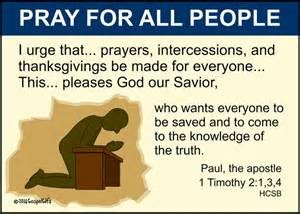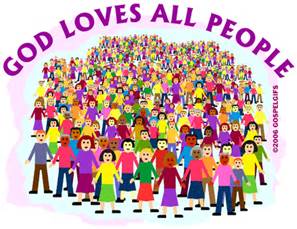



In the huge pile of mail that greeted me upon my return from Trinidad a couple of weeks ago, was a letter from our Bishop, John Schol. Dear Catherine, it began, I understand you are preparing for next year’s full member retreat and examination. You have already been affirmed in your calling and have been leading people to make disciples and grow vital congregations to transform the world, Thank you. A quick glance through the rest of the letter assured me I wasn’t in any trouble – whew! The Bishop actually wrote to offer me words of hope, admonition, encouragement, and support in advance of my upcoming ordination assessment period. His closing words – “Keep the Faith! John.”
When spiritual overseers write to the pastors under their care, their words carry great import for good or for ill. I’d like to think Pastor Timothy felt at least as supported and cared for when he received his letter from his Bishop, Paul, as I felt when I received this letter from my Bishop, John. Bishops or spiritual overseers tend to be rich in faith, grounded in the Scriptures, and seasoned in life and ministry experiences; any instruction they give to those under their care could very well be the Word of the Lord to the minister and to the church.
So we are fortunate this morning to hear this Word from the Lord as we peer over Timothy’s shoulder, reading what his Bishop had to say as he offered words of instruction and administrative guidance to this young leader of the well-established church in Ephesus. Ephesus was a bustling, commercial metropolis in Western Asia Minor; we now call that region Turkey. Paul had left young Timothy in charge of this urban congregation, where philosophical and theological issues were beginning to pose a threat to the faith. So Paul did some fairly close mentoring and coaching in both letters to the young Pastor. In this first letter, just prior to where we begin reading, Paul gives the same exhortation to Timothy as John Schol gave to me – hold on to faith, he says. Hold on to faith and a good  conscience. Then he proceeds to suggest how: First of all, I urge that supplications, prayers, intercessions, and thanksgivings be made…The Message Bible translation – which provided the title for today’s sermon – puts it this way, The first thing I want you to do is pray. Pray every way you know how, for everyone you know. The slightly nuanced differences between supplications, prayers, intercessions, and thanksgivings don’t really warrant separating them into discrete categories of prayer. It was the writer’s way of saying, pray every way you know how.
conscience. Then he proceeds to suggest how: First of all, I urge that supplications, prayers, intercessions, and thanksgivings be made…The Message Bible translation – which provided the title for today’s sermon – puts it this way, The first thing I want you to do is pray. Pray every way you know how, for everyone you know. The slightly nuanced differences between supplications, prayers, intercessions, and thanksgivings don’t really warrant separating them into discrete categories of prayer. It was the writer’s way of saying, pray every way you know how.
In our Christian tradition, to pray is essentially to talk to God. If God does not factor into this faith-building practice, we may as well call it a pious little monologue. Furthermore, if God is not expected to have something to say in response to our petitions, supplications, intercessions, or thanksgivings, then…what can I say? You probably know how it feels to have a conversation with someone where you couldn’t get a word in edgewise to save your  life? Granted, God’s response in the conversation may take all kinds of delightful or terrifying forms, but that calls for the kind of discernment we only get by the act of prayer, by practicing to pray. Prayer is a conversation; it is being in a place of God-awareness. Keep the faith, Paul tells Timothy; hold on to faith by first of all praying.
life? Granted, God’s response in the conversation may take all kinds of delightful or terrifying forms, but that calls for the kind of discernment we only get by the act of prayer, by practicing to pray. Prayer is a conversation; it is being in a place of God-awareness. Keep the faith, Paul tells Timothy; hold on to faith by first of all praying.
You might be saying, “but I don’t know how to pray.” You probably have in mind the eloquent prayers given by clergy or other spiritual leaders in worship. I am happy to clarify that verbal prayer is only one of many, many ways to pray. “How do you pray?”
I asked a few friends. Some kneel and clasp their hands, some walk and lift their hands, some pace the floor and clap their hands, some need to locate themselves in a special place, others pray anywhere, even while they do hair in a crowded salon. Every way you know how, can also mean any way you know how. Our hymn of response suggests prayer can be an upward glance, a falling tear, a heavy sigh; it can be simple, eloquent or desperate words.
Episcopalian priest, and one of my favorite preachers, Barbara Brown Taylor hilariously describes her prayer life in her book An Altar in the World. “Sometimes,” she says, “when people ask me about my prayer life, I describe hanging laundry on the line.” Taylor talks about picking up her husband’s T-shirt and shaking it like a prayer flag. The wooden clothespins inspire her prayer for the Penley Corporation of West Paris, in Maine, which is still willing to make clothes pins from wood instead of colored plastic. “All day long,” she says, “as I watch the breeze toss these clothes in the wind, I imagine my prayers spinning away over the tops of the trees. This is good work, this prayer. This is good prayer, this work.”1
Like Barbara Brown Taylor, I believe our work can be prayer. Preparing that lesson plan can be a prayer for God’s influence over those we teach. Working in the garden can be a prayer for the earth – the blessings it yields and the dangers it faces. As we put the recycling out on the curb may that be a prayer for the sanitation workers who will empty those bins? Taylor encourages us to make the world our altar in this practice of prayer.
In my own prayer practice I often sit in a comfortable spot with my Bible and hymnal. I’ve been known to pray words from hymns I’ve never sung, simply because the poetry expresses so fittingly what is on my heart at the time. I’ve been known to utter groans and moans that have no English translation, breaking out into tear-filled song eventually – feeling the release that music can bring. Then the psalmists have been my prayer mentors for every kind of prayer. They teach us how to give thanks, how to interceded on someone else’s behalf, how to wail in grief and pain, how to shake our fists and say a few choice words in a fit of rage over evil people and horrendous situations over which we have no control. These all qualify as prayer , you know, because they are done before God, with an awareness that God is most present, and welcoming – no matter the state of our heart and mind.
Then the Bishop’s instruction to Timothy takes one further step. Pray every way you know how for everyone you know. Pray especially for rulers and their governments to rule well so we can go quietly about our business of living simply, in humble contemplation. This is the way our Savior God wants us to live. He wants not only us but everyone saved, you know, everyone to get to know the truth we’ve learned: that there’s one God and only one, and one Priest-Mediator between God and us – Jesus, who offered himself in exchange for everyone held captive by sin, to set them all free. (The Message) Did you catch the frequency of the words everyone, and all? What does that mean? It addresses the question, For whom are we to pray? When Jesus commanded the disciples to go into all the world, preaching the gospel he didn’t mention any exclusions or exceptions, did he? Are there people for whom we should not pray, or people who don’t deserve our prayers? The answer from 1 Timothy is a resounding no! Yet I know of Christians who are okay praying for victims while cursing the perpetrators. Some of us feel justified in praying for the murdered and damning the murderer. But according to the Word of the Lord through Paul to Timothy this morning, all people deserve our prayers – the narcissistic liars and the ethically shifty deserve our prayers. Rich man, poor man, beggar man,
thief, presidents, kings, presidential candidates, rulers and leaders of every kind – we pray for everyone, because God desires that all be saved. And through prayer we get to participate in God’s work in caring for and saving the world – no exceptions!
I am confident enough to say this morning, that if this looks difficult, it is only so before we begin to pray. Thinking about praying for our enemies is more difficult than actually praying for them. Because once we begin we discover God is there; and somehow in those moments of aligning ourselves with God, and in the process of attuning ourselves to the Holy in that spiritual realm, we are transformed into a kind of God-likeness that is not possible otherwise. We become overshadowed by the Spirit in prayer, and a holy thing is born in us, that is not of human doing – it is called LOVE. There is where we hear God’s heartbeat of empathy, feel God’s pulse of grace, and enter into God’s storehouse of mercy, mercy that treats us better than we deserve. It is in prayer that we learn to forgive those who trespass against us. This is not armchair Christianity sisters and brothers; this is getting on the field and into the action of the Kingdom. God wants liberty and justice for all – that is the message of the Kingdom Jesus demonstrated and taught; that is what we pray for every time we say Thy Kingdom come, Thy will be done on earth as it is in heaven.
John Wesley, the founder of Methodism, called the practice of praying without ceasing a hallmark of the Christian. When Wesley preached that “prayer continues in the desire of the heart, though the understanding be employed on outward things,”2 he was describing a life of constant, albeit subconscious engagement with God, where everything we do happens in that subliminal awareness of God with us, God in us, God for us. So that not only are we in continuous engagement with God, we are also in a constant posture of openness to hearing, seeing, discerning God’s response, which may come in the words of another person, in the words of a poem, in the inspiration of a work of art, in the cry or laughter of a child, in the melody of a song – one of my colleagues refers to this as the ubiquitous grace of God.
Pray every way you know how for everyone you know. We have a prayer chain ministry here at Princeton United Methodist Church that lifts up the needs of people here and around the world. I am part of that prayer chain, so for every request that comes in, I join my voice and heart, praying for everyone I
know. Allow me to share a deeply personal reason why I pray for others; it is because at a time when I needed it more desperately than I knew, others prayed for me, and prayed me through to a personal victory.
I’ve been married to the kindest man on the planet for thirty-eight years now; but less than 8 years into the marriage it was broken and we eventually parted ways. We had friends and family who prayed for our restoration. My Dad told me he prayed every day for my marriage during those five years of separation. At one point I said sarcastically to my friends, “You know there are famines in Africa, and monsoons in India that you’d be better off praying for.” Not only did my friends ignore my pessimism, the prayers were amped up by people whom I subsequently met, who never even knew Harran. Hindsight helps me believe all those accumulated prayers amounted to what I could only call a spiritual battering ram. That’s the only explanation I could give for the stupendous outcome of a marriage retreat Harran and I reluctantly attended, led by a couple of eccentric lay people. We went there totally estranged, and left there three days later arm in arm and googly-eyed, because we fell hard in love all over again. My vivid recollection of how that weekend felt was like a battering ram of accumulated, stubborn, intercessory prayer crashed through that heavily fortified wall of protection around my heart, and the healing light of God’s love came streaming in. I call that 180 degree turnaround my miracle of Red Sea proportions. Our friends and family had no idea – nor did we – what God would do in response to their repeated prayer for us. They simply refused to become weary in well-doing.
I don’t offer this as a formula for God at work in our relationships; God responds to prayer in mysterious and customized ways, and there is a great deal more to the story. But this weekend episode is a major source of my inspiration to pray for everyone I know, because over, and over, and over I have witnessed the activity of God in complex situations that defied human remedy or solutions. And I believe, like it says in 1 Timothy that there are no exclusions to God love and mercy, there is no-one outside the merits of God’s grace. And so people of God let us pray, pray every way we know how, pray for everyone we know. Pray for our country in this critical hour of decision; pray for our world as wickedness and violence tear apart human community. Who knows when and how those `Thanks be to God, Amen!
Written by Isabella Dougan
